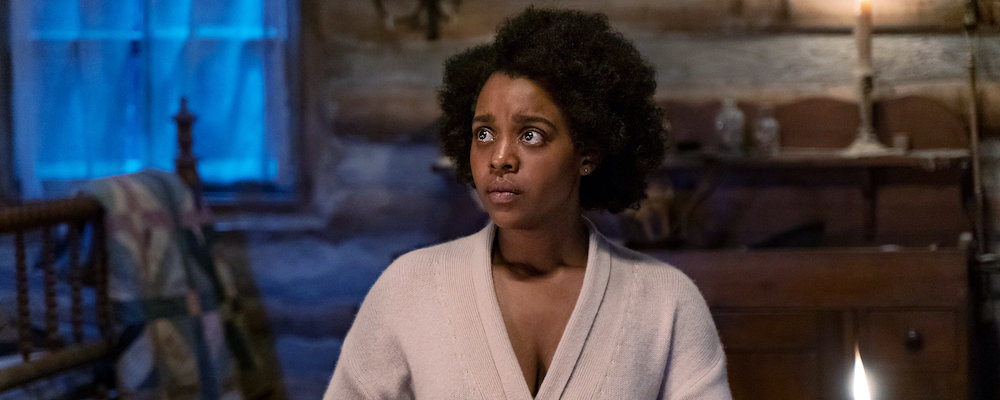‘Kindred’ Blunts the Edge of Octavia E. Butler’s Riveting Novel About Time Travel and Slavery
Alci Rengifo
Great novels are always natural candidates for good films and TV. Producers or showrunners assume if the book is acclaimed, then half the work of crafting an enticing story has already been done. So it must have been a no-brainer to adapt one of the most renowned works by Black American sci-fi author Octavia E. Butler. “Kindred” comes with plenty of material tailor made for our cultural moment. The original novel on which it is based was published 43 years ago, and now seems ahead of its time. Time travel and reckoning with America’s slave history is now a common combination of themes. This FX production, streaming on Hulu, does well in bringing the concept to life, even if some of its spirit is lost in the material now being overly expanded for a whole series.
The story is updated to 2016 where we meet Dana (Mallori Johnson), a young Black American woman who has sold her grandmother’s New York City house to move to Los Angeles. Her goal is to break into screenwriting for soaps, even if she hasn’t figured out screenwriting itself yet. Dana is an orphan with the closest thing to a mother being her aunt, who is upset over the sale of the house. She finds escape with Kevin (Micah Stock), a nice waiter who soon becomes more than just a friend. What Dana is keeping secret is that she has been awakening in her new house inside vivid, terrifying dreams that seem to take her back to a slave plantation in the 19th century. In this sudden environment, Dana experiences the oppression of slavery while finding herself having to save Rufus (David Alexander Kaplan), the son of the plantation overlord, Thomas (Ryan Kwanten). For Kevin, Dana’s sleepwalking and late night screaming might mean she’s having a breakdown of some kind. But when Dana manages to also take Kevin with her into the past, they both have to maneuver a different, frightening world and the family secrets contained within.
The subject of American racism, historical trauma and slavery has made for important, riveting shows from “The Underground Railroad” to “Lovecraft Country.” Compared to those titles, “Kindred” is a surprisingly lighter production. It has moments of genuine, unnerving atmosphere in scenes where Dana awakens into a historical nightmare, finding the eyes of strangers staring at her. Dana is also convincingly introduced as an archetype of the millennial or zoomer living as an independent young woman, but not necessarily stable in their career choices. Anyone in L.A. will recognize this character, suddenly having the means to buy a place in the ever so expensive city while pursuing a job everyone else in California wants. At first she sleeps on blankets on the floor and is suspicious of Kevin, a white guy whose charm lies in being sincere yet goofy. It’s a total change from the novel, where Dana and Kevin are a married interracial couple embarking on this searing adventure together. Of course in the ‘70s that idea was much more radical than today. Playwright Branden Jacobs-Jenkins isn’t doing a faithful adaptation of the novel but loosely borrowing the main plot points.
The rest of “Kindred” seems to be chasing after the archetypes of much better shows and films about slavery and the Black American experience. The casting is strong and photography efficient, yet the writing never really takes off beyond presenting very familiar story threads. Thomas is the drunken slave master married to Margaret (a perfectly cast Gayle Rankin) but his real desire is reserved for a slave, Winnie (Amethyst Davis). This show certainly does a better job evoking what a modern person would feel if they confronted slavery than last year’s misguided “Antebellum.” Too much of its promise fades away because “Kindred” is meant to keep going as a series into more seasons, possibly attempting to follow the lead of Hulu’s “The Handmaid’s Tale.” Mysteries are established and left in the air. Hints are given about how some of the slaves and Rufus connect to Dana’s journey but we’re left having to wait for more answers later down the road. Any true biting social commentary is also left behind, even with the character of Kevin, who becomes more of a generic supporting role with each episode. We sense more conflict when he deals with being instantly accepted into the slave owner’s home, while Dana of course is seen as chattel. There are some nosy white neighbors who are a jab at people who know how to keep their prejudices blunt and subtle, yet they are never as terrifying as the racists in Amazon’s “Them.” We see “Karens” so often now that the writing should aim for a deeper commentary or new spin.
What we’re left with is a good performance by Mallori Johnson and a very likable one from Micah Stock. Everyone else is also convincing in their roles. It’s the show that never becomes as compelling as the material demands. The late Octavia E. Butler belonged to that roster of women authors like Ursula K. Le Guin, who used science fiction as a potent form to make radical statements, imagine bold futures and crystalize ideas about our society by using fantasy as powerful symbolism. “Kindred” seeks to be more of a Blumhouse-style thriller without the deceptive simplicity of that studio’s best work. The showrunners should have been bold enough to stick to Butler’s richer statements and in a more compact way. There are some good things in this show and it avoids becoming a slog. But after watching “Kindred,” go find the novel if you have not read it, because it truly is relevant and unforgettable.
“Kindred” season one begins streaming Dec. 13 on Hulu.

